Iran Insists On Its Right To Block Borders With Afghanistan

The commander of the Ground Forces of Iran’s Army has affirmed Tehran's intention to proceed with a plan to build fences to block its borders with Afghanistan.

The commander of the Ground Forces of Iran’s Army has affirmed Tehran's intention to proceed with a plan to build fences to block its borders with Afghanistan.
Kioumars Heydari said Friday, "We intend to block our borders, and no one can object why we erect a fence near their border. This is not unjust to neighboring countries, as it is common practice in all countries."
Heydari’s comment came in reaction to remarks by Taliban spokesman Zabihullah Mujahid, who said earlier in the week that Afghanistan is safe and poses no threat to any country, claiming that any blockade at the border should be coordinated with Kabul.
Denouncing Iran’s plans for a border fence, Mujahid told Afghanistan’s TOLOnews that "if such actions were taken when there was no security or there was war... there would be some justification. Now there is no need for such measures."
The rising number of Afghans migrants in Iran has led to controversy among citizens and officials, unsure whether the presence poses a threat or an opportunity for the regime. There are multiple estimates regarding the size of the Afghan diaspora population in Iran, but precise numbers are scarce due to Afghans' reluctance to participate in official counts and registrations.
Heydari emphasized that occupation and invasion of neighboring countries are not part of the Islamic Republic's strategy and approach, stating, “However, ensuring sustainable security is a mission entrusted to the armed forces, and this security is achieved through drones or cameras at times, and at other times through physical presence of security forces and border blockades. Therefore, others cannot dictate to us what we should do at our borders."
Iran’s Interior Minister Ahmad Vahidi confirmed Iran’s plans to block the border areas with Afghanistan earlier in the month, explaining that “It's not a wall, it's a border blockade that is being pursued according to the plan.”

The owner of an Iranian mobile phone retail store who claimed to sell the iPhone at about half its price has gone into hiding, state media cited police as saying.
Kourosh Company ran extensive advertisement campaigns to sell Apple's iPhones, with prices starting at 200 million rials (about $400) for a model worth almost twice that much. The company claimed that it can secure the low price by "eliminating intermediaries."
Reports suggest that the company had not delivered the phones to customers, leading some people who had pre-purchased mobile phones to file lawsuits against the company.
Following the government sealed the company's offices, media reported the disappearance of owner Amirhossein Sharifian.
Citing an informed police source, IRNA claimed operations are underway to arrest him, and his case is being pursued by the economic security police. Tasnim news agency reported that the father of the company's owner was arrested on charges of "collusion" in the case.
A lot of Iranian celebrities had appeared in the company’s publicity ads, asking people to trust the company and promising that they would not regret it. The celebrities who appeared in the ads are under fire on social media networks.
In 2022, the Islamic Republic said it would not allow legal imports of iPhones and would not register iPhone 14 and newer models, as an unnecessary item draining the country's foreign currency. Despite the ban as well as not functioning with Iranian sim-cards, new models are available at the market with prices reaching as high as $2,000 for expensive models.
In August 2022, Supreme Leader Ali Khamenei issued a call to prohibit the import of "luxury American phones" into Iran.
A photo of Qasem Soleimani’s daughter holding the latest iPhone 13 at the second anniversary of her father’s death in 2022 led to a storm of criticism that overshadowed the ceremonies.
In January 2022, a report said Iran spent $9 billion in foreign currency to import mobile phones in 33 months, with a large portion going for “luxury” devices with a price tag of over $600.
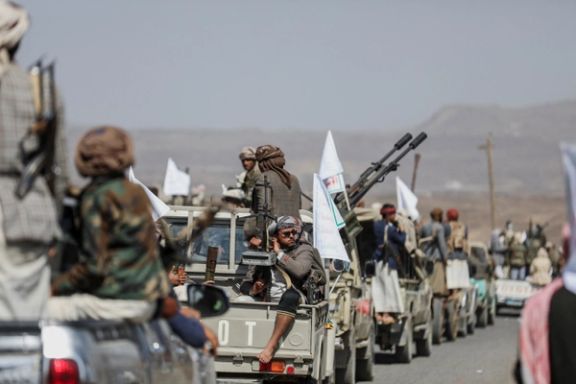
Iran’s Revolutionary Guards forces are present in Yemen, “serving side by side” with the Houthis, the deputy commander of US Central Command has revealed.
In an interview with CBS published Thursday evening, Vice Adm. Brad Cooper said IRGC personnel are on the ground “advising” Houthis and “providing target information”, which helps them attack commercial vessels and even US warships in the Red Sea.
With IRGC’s crucial help, the Houthis have targeted more than 40 ships in the Red Sea since October. They claim to be targeting Israeli-connected vessels only, but their operation has effectively disrupted global maritime trade, with many major operators avoiding the passage altogether and going around the southern end of Africa.
The Houthis began their attacks in mid-November after Iran's ruler Ali Khamenei called on Muslim nations to enforce a blockade against Israel. They have continued to launch missiles and one-way drones despite several rounds of US/UK airstrikes on their sites.
"[IRGC is] resupplying them as we sit here right now at sea," Vice Adm. Cooper
said in his interview.. "We know this is happening… This is crystal clear."
When asked about the US efforts to counter IRGC support and “degrade” the Houthi capabilities, Cooper pointed to the Biden administration –in what some may read as an indirect criticism of the administration’s Iran policy.
“In the end it’s a policy decision,” he said, “our role at this point is simply be ready and continue to be aggressive and exercise our right to self defense.”
The Biden administration has faced constant criticism over its cautious approach towards Iran. The critics say the policy of ‘avoiding confrontation at all costs’ has in fact cost American lives and raised the cost of confronting Iran, which, they say, may be inevitable, given the regime’s growing belligerence –not to mention its nuclear program.
One of President Biden’s earliest decisions entering the White House in 2021 was to delist the Houthis as a terrorist organization. It was a controversial decision from the outset, and was eventually reversed after three years when the Houthis carried out numerous attacks on commercial ships (and US warships) in the Red Sea.
Earlier Thursday, US Central Command announced that US Coast Guard forces had intercepted a vessel in the Arabian sea with Iranian weapons headed for Houthi-controlled areas of Yemen.
"This is yet another example of Iran's malign activity in the region," CENTCOM commander Gen. Michael Erik Kurilla said in a statement. "Their continued supply of advanced conventional weapons to the Houthis is in direct violation of international law and continues to undermine the safety of international shipping and the free flow of commerce."
The cargo contained components that would be assembled on site, including for medium-range ballistic missile and underwater drones. There were also military-grade communication and network equipment, as well as anti-tank guided missile launcher assemblies.
NBC News also reported that the US also conducted a cyberattack recently against an Iranian military ship in the Red Sea and the Gulf of Aden that had been collecting intelligence on cargo vessels.
The cyberattack took place a week ago as part of a government response to a drone attack by Iranian-backed militias in Iraq that killed three US service members in Jordan late last month and wounded dozens of others, the report said.
Iran has been arming and supporting the Houthis for at least a decade. The rebel group began fighting the government in 2014 and has been controlling one third of the country for some time.
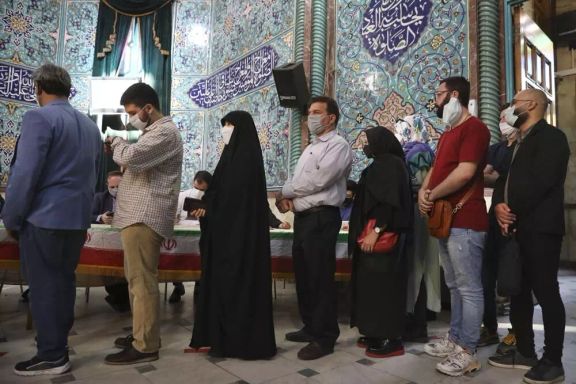
An influential hardliner in Iran has threatened the Reformists that they might be barred from next year's presidential election if they continue to boycott the March parliamentary vote.
Hossein Shariatmadari, the editor of hardline daily Kayhan and Supreme Leader Ali Khamenei's representative at the flagship hardline newspaper who made the threat, has no executive position and no responsibility about the elections.
Shariatmadari's threat came two days after Iran's main collective reformist organization, the "Reform Camp of Iran" announced in a statement that reformist parties and groups will not take part in the parliamentary elections in Tehran because the system is biased against Reformists and elections in Iran are not free and fair.
Iran’s ultraconservative election watchdog, the Guardian Council, has banned almost all Reformists from running in the March 1 parliamentary vote. The reformists were effectively banned from taking part in the previous parliamentary election in 2020 and the presidential election in 2021.
The general dissatisfaction among voters about the deteriorating economic and political situation in Iran and a completely uncompetitive election has led to predictions of extremely low turnout on March 1.
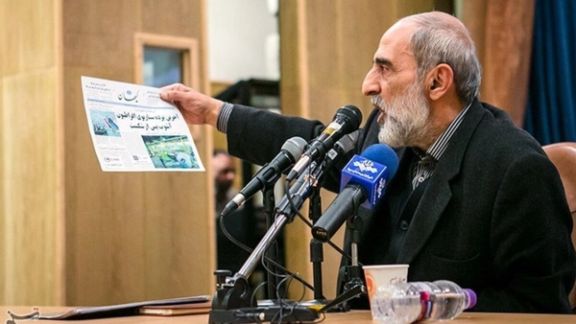
However, Shariatmadari also insisted earlier in the week, without presenting any evidence, that turnout in Tehran will be 20 percent higher than what it was in 2020. This comes while all forecasts in Iran put the expected turnout between 8 to 15 percent.
During the past weeks, hardliners in Iran have been doing whatever they could to encourage people to go to the polls. Khamenei's leading religious singer Saeed Haddadian said on state TV that not taking part in elections is a cardinal sin in Islam! Earlier Hossein Shariatmadari had said that voting in elections is tantamount to Jihad! Many clerics who are on the payroll of the state have also made extravagant statements about the urgency to vote and in praise of Iran’s ruler Ali Khamenei.
Earlier in this week, former lawmaker Hedayatollah Khademi told the press that after his disqualification for the upcoming elections, he was approached by go-betweens from the Guardian Council who demanded $120,000 to have his qualifications endorsed by the clerics at the election watchdog. Khademi said that various go-betweens wanted 100 billion rials to have his credentials approved by the Guardian Council. He added: "The figures they demanded were almost similar. They wanted 100 billion rials, or 300 standard gold coins, or $120,000."
Meanwhile, it was disclosed by hackers who targeted the parliaments servers that the current ultraconservative lawmakers receive a monthly salary of over 2 billion rials per month, or about $4,000.
That is more than 20 times the salary of an ordinary government employee. Following the hacking, the parliament held closed-door sessions on Wednesday and banned the entry of journalists. Subsequently, the parliament claimed that what the lawmakers actually receive is one tenth of what the hackers have claimed. This comes while the hackers have published the parliament's own documents about the lawmakers' salaries.
In the meantime, reports from Tehran say that while less than two weeks remain before the voting day, even the conservatives who have been allowed to run, have not been able yet to form any alliance to determine who will be on their lists of candidates particularly in the significant constituency of Tehran.
The reports said that a fierce battle is going on over the speakership in the new parliament. What is clear is that the ultraconservative Paydari party is adamant to replace the current Speaker Mohammad Bagher Ghalibaf. If they manage to do so, they will literally take over the entire legislature.
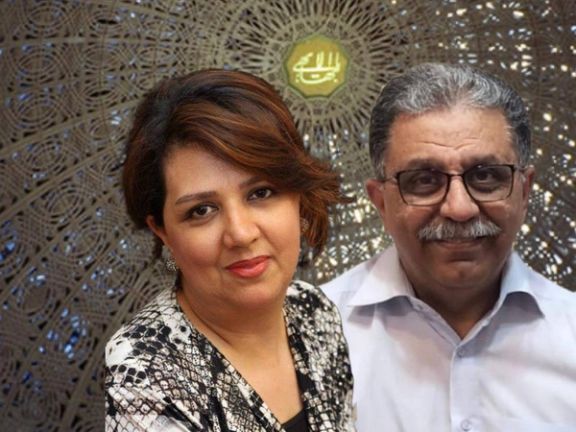
Amid the Iranian regime’s systematic persecution of the Baha’i religious minority, a Baha’i citizen has been sentenced to nine years in prison, as others languish in prison.
According to reports on Thursday, Tehran's Revolutionary Court headed by notorious Judge Abolqasem Salavati sentenced Kayvan Rahimian to five years of imprisonment, six years of the deprivation from social rights and a total fine of 500 million rials ($1,000). He was accused of engaging in “deviant education or propaganda activities that contradict or disrupt the sacred law of Islam.”
Moreover, he was handed down another 4-year sentence over the allegation of “assembling and conspiring to commit a crime against national security.”
Karimian has been in Evin Prison since July 18, 2023, when he was arrested by security forces. A translator, psychologist and professor at the Baha’i virtual university, he had already served a 5-year sentence for teaching young Baha’i students. He was released six years ago.
The Iranian regime has barred the Baha’i community, which it labels as heretics, from studying at universities and academic institutions.
Meanwhile, Nooshin Mesbah, another Iranian Baha’i citizen, has been taken to Vakilabad Prison in Mashhad to serve her one-year sentence. She was convicted by Mashhad’s Revolutionary Court for her alleged membership in a group “aimed at undermining the order and security of the country.”
In December, the Baha'i International Community (BIC) issued a statement accusing Iran of employing brutal tactics to persecute the country's Baha'i religious minority.
Nine Iranian political prisoners warned in November that in the event of the expansion of the ongoing Middle Eastern conflict, the Iranian regime would intensify its crackdown against civil and political activists, women and student movements, as well as religious minorities such as the Baha'i community.
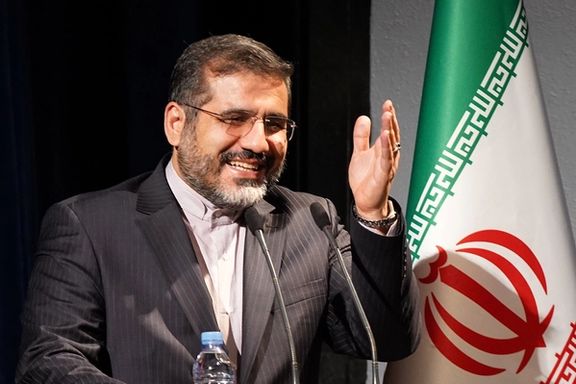
Iran's Culture Minister stated on Thursday that music and musical works cannot be promoted, given the opposition of the clerical government that creates "constraints."
Speaking about balance between the pressures from the clerics and the growing demand for diverse cultural expressions, Mohammad Mehdi Esmaili emphasized the need for governmental decisions amidst conflicting interests.
"On one hand, we face pressure from the religious community, and on the other hand, we witness the taste and eagerness for new and innovative fields, and in the position of governance, we must decide."
"In no upstream document of the Islamic Republic of Iran after 45 years has there been any discussion about music,” he added.
The remarks come against the backdrop of ongoing tensions between fundamentalist religious factions and proponents of cultural diversity. Since the 1979 Revolution, pop music has been labeled as "haram" or forbidden, leading to a flourishing underground music scene and a penchant for foreign-based artists among Iranian music enthusiasts.
Despite restrictions on performances within the country, Iranian fans display remarkable enthusiasm for concerts by their favorite diaspora singers, often traveling abroad to attend. The trend has created a global community of Iranian music aficionados, with foreign-based artists overshadowing their domestic counterparts in popularity.
Moreover, concerts by Iranian expatriates serve as platforms for amplifying the voices of Iranian protesters, garnering international attention and support. However, Iranian state-run media has consistently criticized the artists, accusing them of exploiting popular protests for personal gain.